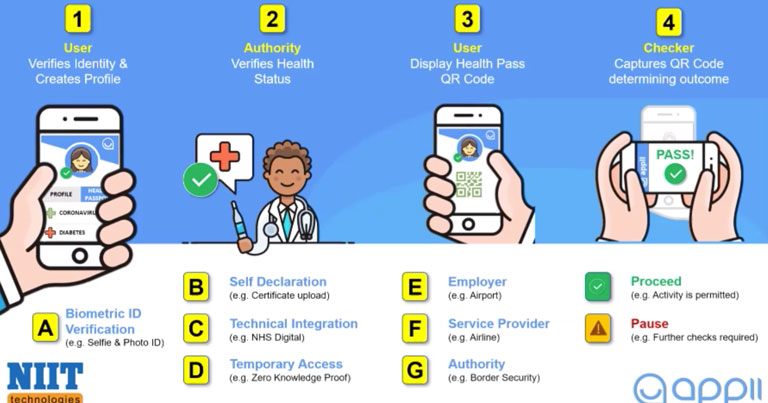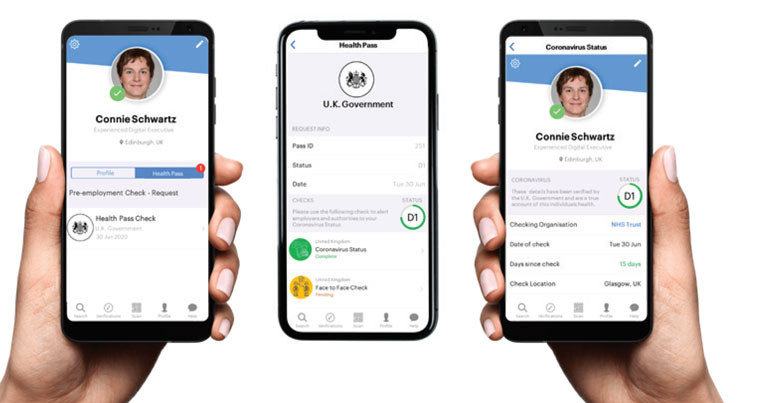In recent weeks, the aviation industry has been discussing plans and strategies to ensure safe and secure air travel, once airports and borders open again. While it is still uncertain when restrictions to citizens’ movements will be lifted, the transition from the coronavirus lockdown will require careful management to stop, or at least minimise, the possibility of a further outbreak. One solution that has been widely discussed is the introduction of immunity passports.
During a webinar, hosted by NIIT Technologies and APPII last week, industry leaders looked into the efficacy of this technology to enable this swift transition from lockdown for companies in the travel, transportation and hospitality industries.
The right balance between containment and restarting the economy

Simon Lamkin, Global Head of Travel Advisory at NIIT Technologies Limited, opened: “The focus of the lockdown strategy around the globe has been purely containment. As we start thinking about moving again, organisations are developing strategies to restart their operations. We have to get the balance right between containment and opening the doors to restart the economy, in order to get employees safely back to work and develop plans to enable us to get back to travel systems.”
In response to this need, NIIT Technologies has partnered with online verification platform APPII to develop and deploy a digital health passport solution that helps determine and verify the health status of an individual. According to Lamkin, the solution has a wide range of post-lockdown use cases, from helping workers get back to their workplace to ensuring people can travel safely.
So, what is an immunity passport? The theory of health passports has, indeed, been around for some time. An example of this is the traditional paper-based processes already recognised as the International Certificate of Vaccination, also known as Yellow Fever card.
“The concept is here, and we are now looking into how we can digitise that and bring it to bear,” explains Lamkin. “It will all come down to trust – how individuals can verify that they are safe, and how companies can provide a safe environment for their employees.”

Gary McKay, Managing Director & Co-founder of online personal verification platform APPII, then provided more detail on how the platform will work. “In context of the coronavirus health status, we are trying to determine how we can verify people’s health status. One way to do that is through self-declaration such as uploading health certificate, or through authorised verification of health.”
Individuals using APPII can biometrically verify themselves via the APPII mobile app, have their coronavirus status catalogued through self-declaration or via an authorised verifier, and therefore prove their health status using their APPII profile to those that require to see it.
Employers will be seeking to manage the transition of employees from the position of working from home back to the workplace. In the context of the aviation industry, digital health passports can be applied to meet rigorous requirements to allow free movement of people.
The feasibility of the concept was then discussed by different participants during the webinar.
Secure and encrypted data

Of course, privacy issues spring to mind when it comes to apps dealing with such sensitive data. According to McKay, the data that is held in the platform is encrypted. “When it comes to the storage of data only the individual gains access to this information and they have full authority on the platform to allow access to this information. One of the key fundamentals for us is to put the control back in the hands of the consumer. We are looking to integrate with third party health care providers but not for putting the data into the platform, but to gain access to that data temporarily for the purposes of the context this individual wants to undertake, whether that’s to get back into employment or joining a workplace or whether it’s a passenger on an aircraft.”
Focusing on privacy issues and GDPR, Bill Buchanan, Professor of Cryptology, Edinburgh Napier University, added: “It’s unbelievable that we still live in a world of paper, so everything we have created since the start of the internet is still a paper-based approach. We really need to move into 21st century and have some digital credibility.
“The foundation of this world has already been created with the Public Key encryption. The true way to create our digital identity is to have what’s called a PKI – a private key that I keep and store on my phone, which carries my unique identity and then everyone in the world can prove my identity through my public key.”
Abhi Chacko, Head of Commercial & Innovation, Gatwick Airport, offered his personal opinion and also backed the viability of such digital solutions. However, he pointed out that in the UK there is already a capacity problem in testing both in public and private labs. “We will have to overcome this hurdle first, before testing becomes available for the travelling public. But I do see four to five months down the line that there should be enough testing capacity which then can be used for the travelling public. For things like health passports becoming viable, for instance, the government or the airlines can introduce a rule in which you should be tested 24 hours before travel, or you should have your immunity which is valid for six months or one year. And that information needs to be passed on to the airline and airport system before we can allow passengers to go through.”
He continued: “That’s where technologies like these will really help, otherwise we will have to go back to printed documents and in addition to the passport you will have to carry one or two additional immunity test results as well, and that would have to be physically checked by the airport or airline staff. So, the concept is good, and it is likely to become viable four to five months down the line when testing becomes available.”
Social distancing at airports is impractical
Chacko also took the opportunity to provide some examples of the solutions that the industry is exploring to ensure a safe airport experience. Among the technologies are temperature screening, however, he pointed out that in order to implement this, there has to be further legislation because of GDPR restrictions. Deploying robotics for cleaning, particularly floor cleaning for disinfection and using ultraviolet light technology to disinfect hand luggage trays, as well as the handrails of the travelators, are also options. At the high touch security area, antibacterial coating may be useful to kill the virus on surfaces.
In terms of social distancing, Chacko said: “Looking at this from an industry perspective, it is a bit impractical to have social distancing in the airport environment, so my preference is to see people wearing masks, so that they protect themselves as well as others. But in some places where we can all reduce queues and bring an orderly process, we would do that with the help of technology. For example, at Gatwick Airport for boarding we have come up with a concept called Bingo Boarding, which displays the boarding sequence by seat and people can walk to the jet bridge at the appropriate time as displayed on the screen. We provide the software platform, which can easily be integrated into an airline app, and it can also take the data from the airline in terms of passenger information and which groups can be boarded together.”
Consistency will build confidence
Shashank Nigam, CEO, Simplifying, spoke from an airline passenger perspective and agreed that health passports will give passengers an opportunity to skip the health checks that are likely to become mandatory at airports.
Having a health passport will allow passengers to skip all of those checks and get to board faster and arrive at the airport later.
However, Nigam pointed out that the real issue is inconsistencies between countries and this is what governments, airlines and regulators will have to address to build the confidence to bring the passengers back. Indeed, in his recent report, titled The Rise of Sanitised Travel, Nigam describes how he expects to see post-COVID-19 travel to be guided by a Transport Health Authority (THA), just like 9/11 led to the creation of the Transportation Security Administration (TSA) in the United States.
During the webinar he explained: “We need governments to work together to create a consistent standard. Let’s look back to 9/11 – two months after 9/11, the TSA was created with a budget of one billion dollars. The very next year its budget rose to $4.8 billion, and all of this was to ensure that people are safe. We have a similar need right now.”
He continued: “Everything from disinfection tunnels on the kerbside, to having bags being sanitised, to simplifying the boarding process with individual notifications as to when people are boarding – all of that will be critical. And of course, the standards are different from country to country, but we need these standards to be the same. Consistency will build confidence.”
Echoing Nigam’s comment, Chacko also said: “Personally, I feel like there could be more guidance coming from the likes of ICAO or IATA on travel. Different countries, airports and airlines are currently experimenting with different solutions. Now is the time to have some sort of common guidelines so that everyone can be aligned around aviation travel requirements.”
Discussions around the need for immunity passports will certainly continue to take place in the next few months. In the short-term, the solution could prove instrumental to getting employees back to work and bringing back passenger confidence when travelling. What is certain is that there needs to be more legislation and common guidelines put in place to create a consistent and smooth passenger experience.







